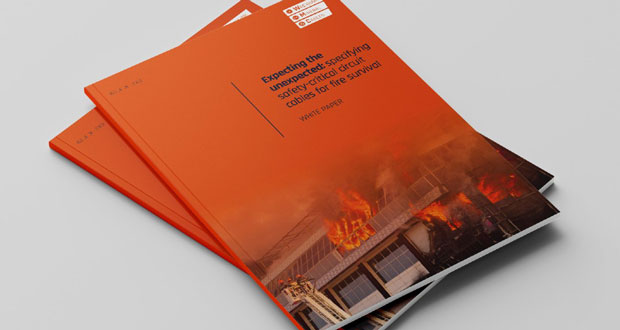Wrexham Mineral Cables (WMC) is calling for better building safety standards through the use of fire survival cables before more lives are put at risk.
The UK cable manufacturer’s call to action comes after the recent fire in a residential tower block in Dagenham, east London, which required the evacuation of 80 people. The incident occurred just weeks after a blaze at the historic Somerset House.
According to WMC, these high-profile fire events underscore the urgent need for building designers and specifiers to identify and install appropriate cables that can survive – not just resist – real-life fire scenarios.
Currently, specifiers are presented with a choice between polymeric cables and mineral insulated copper clad (MICC) cables. Due to the existing testing regime, both cable types are classed as fire-resistant, creating a misleading impression of equivalence. However, MICC cables have consistently demonstrated superior performance and proven to perform to higher safety standards in ‘real fire’ scenarios.
In 2023, WMC published a white paper ‘Expecting the unexpected: specifying safety-critical circuit cables for fire survival’ outlining how cables – often an overlooked component of a building’s system –directly impact building safety. The paper advocates for the introduction of a higher classification of fire survival cable, which can continue to power critical circuits in the event of a fire.
Colin Hughes, Group Manager at WMC, commented: “Last year, the UK Government introduced stricter building regulations in England as part of new secondary legislation to implement the Building Safety Act. Sadly, recent events in London remind us that buildings of all types remain at a high risk of fire, and we must take every measure to ensure their safety.
“Fire survival cables are a vital component of building safety, yet they often remain an unrecognised hazard. Due to the lack of understanding about the important role they play in keeping buildings safe, all too often inferior cables are frequently installed, which may prove inadequate in the event of a fire. This uncertainty can only be addressed when all fire-resistant cables, regardless of size or construction, are subjected to true fire scenario tests.”
Frontline workers form the backbone of facilities management services, serving as the face of the brand and interacting directly with customers. Yet research by both L&G and the Living Wage Foundation reveals the majority feel overlooked and expendable.
Accelerating the problem is a growing technology gap. Despite having 2.7 billion deskless workers worldwide, representing 80 per cent of the global workforce, only one per cent of software and technology investments has been allocated to this segment. This means there is a huge disconnect between frontline workers and their headquarters, leading to lack of sufficient training, communication challenges and low employee retention.
For this webinar, FMJ has teamed up with frontline training platform Lingio to bring together a panel of experts, to discuss how easy-to-use and efficient AI tools can help create engaging and gamified learning experiences that fit the needs of underserved deskless workers. The result? Better software and learning experiences lead to improved staff engagement and reduced staff turnover by up to 95 per cent, according to McKinsey.
To register for the webinar taking place on 11 September at 11:00 am click here.





